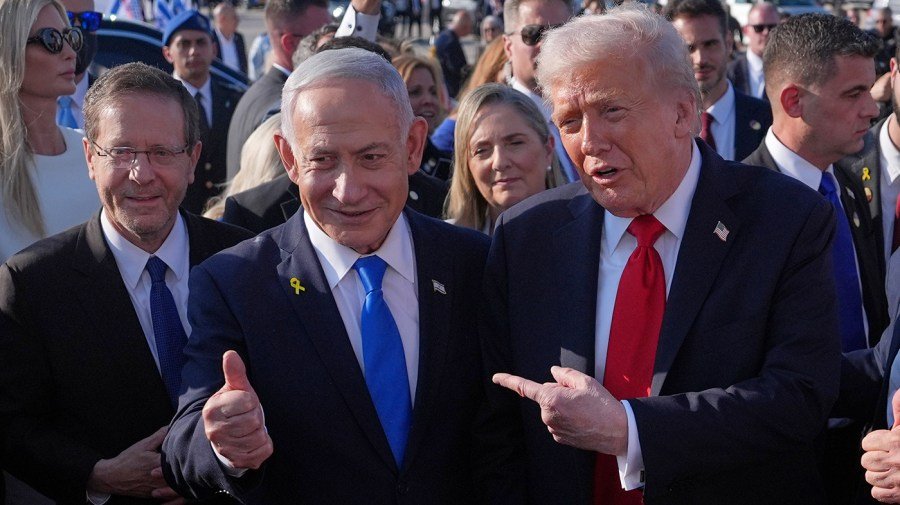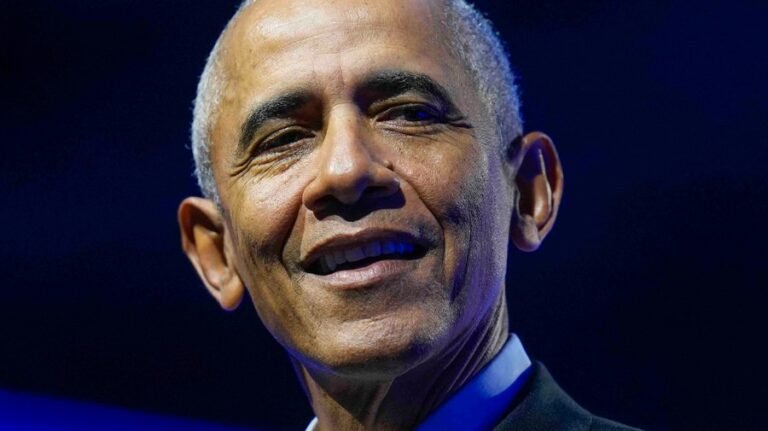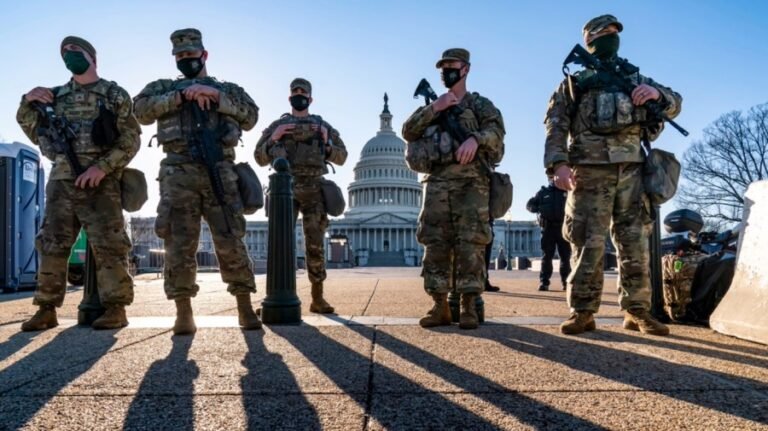
President Trump on Monday completed a whirlwind trip to the Middle East to tout what he called an “historic dawn of a new Middle East” and formally sign a peace deal to end the fighting in Gaza between Israel and Hamas.
The trip was something of a victory lap for Trump, who basked in applause from Israeli lawmakers at the Knesset and was repeatedly praised during proceedings in Egypt. It was also a cause for celebration for many families as Israeli hostages held by Hamas were released after two years of captivity.
Palestinians also rejoiced when Israel let out 250 Palestinian prisoners from Israeli jails and 1,700 Gazans arrested after Hamas’s Oct. 7, 2023, attack.
Here are five takeaways from Trump’s trip.
Trump confident ‘war is over’
Even as Trump’s 20-point peace plan for Gaza was in its early stages and many questions remain, the president expressed confidence from the time he departed for the Middle East that the agreement would hold.
Aboard Air Force One en route to Israel, Trump told reporters the “war is over.” Trump relayed the same message to reporters upon landing in Israel. And during remarks in Egypt, Trump declared, “War in Gaza is over.”
“This took 3,000 years to get to this point. Can you believe it?” Trump said as he signed the peace agreement at a ceremony in Egypt. “And it’s going to hold up, too. It’s going to hold up.”
But experts and even some Trump allies are less certain, pointing to various obstacles that remain to ensure a lasting peace in the region. The peace plan requires Hamas to decommission its weapons, and it’s unclear whether the militant group will do so.
“A word of caution,” Sen. Lindsey Graham (R-S.C.) posted on the social platform X after Trump’s Knesset speech. “As I speak Hamas is attacking groups that have stood up to them and will purge all opposition if a regional stabilizing force is not deployed quickly. Case in point, dozens were killed in Gaza today after conflict between Hamas and local militias.
“Disarming Hamas and making sure they never have a voice in the future of Gaza is going to require efforts by the region never known before.”
Israel works to recover deceased hostages
While the last remaining 20 living hostages all returned from Gaza to Israel on Monday, a wide search was being carried out for the bodies of 28 other hostages Hamas had kept inside Gaza over the course of two years of war.
The Israeli military said the coffins containing the remains of four hostages were transferred to Israel, bringing the count of remaining bodies to 24. The International Committee of the Red Cross is helping facilitate the transfer of the deceased bodies.
Israeli media reported that Hamas conveyed it needs more time to retrieve and hand over the bodies of the deceased, suggesting some of the bodies might be in areas currently held by the Israeli military.
The Hostages and Missing Families Forum, a coalition of advocates and families of the hostages held by Hamas, said in a statement Friday it wants the ceasefire suspended over Hamas’s failure to return all 28 of the bodies on the agreed upon moment.
The group has historically been a strong backer of the ceasefire and hostage release deal and often critical of Netanyahu as an obstacle to an agreement.
“Hamas’s violation of the agreement must be met with a very serious response from the government and the mediators,” the group wrote in a statement.
“An agreement must be honored by both sides. If Hamas does not fulfill their part, Israel should not fulfill their part either.”
Netanyahu skips peace summit but Abbas attends
Israeli Prime Minister Benjamin Netanyahu cited the Jewish holiday of Simchat Torah as preventing his travel to Egypt for the peace summit despite an invitation from Trump. But his physical absence appeared to demonstrate the enormous challenge ahead to reach a lasting peace agreement between Israel and the Palestinians.
Absent Netanyahu, Trump embraced Palestinian Authority President Mahmoud Abbas, the 89-year-old leader who holds power in the West Bank. It was only the second time Trump was meeting Abbas, with the president smiling and holding the Palestinian leader’s hand as they posed for a photo, and held a short conversation.
Trump has identified a reformed Palestinian Authority being brought into a stabilized Gaza Strip. Netanyahu has laid out strict metrics for the Palestinian Authority to meet before returning to Gaza. But he has rejected the establishment of a Palestinian state, which Trump’s plan also lays out.
The president also repeatedly cited the other Middle Eastern nations represented in Egypt, including leaders from Qatar, the United Arab Emirates, Turkey and Saudi Arabia, not all of which have strong relations with Israel but who will be critical to ensuring peace in the region.
Trump calls on other countries to join Abraham Accords
Trump repeatedly referenced the Abraham Accords, a key foreign policy achievement of his first term, during Monday’s events, a sign he is already looking at ways to build on the Gaza deal and bolster his legacy in the region.
“We’re going to get a lot of people joining the Abraham Accords,” Trump said in Egypt. “We have the four great nations that did it early on, and they stayed with it. … Now a lot of people, even today, they’re talking about all joining up.”
Trump at multiple points pronounced “Abraham” in a manner similar to how Netanyahu would, quipping that he enjoyed the Israeli pronunciation.
The Abraham Accords, which were signed in 2020, normalized relations between Israel and multiple Arab states: Bahrain, the United Arab Emirates and Morocco. Prior to the accords, only Jordan and Egypt had recognized Israel.
Other Arab nations, like Saudi Arabia, have said there must be a Palestinian state before they agree to normalize relations with Israel.
But Trump appeared to be riding high off of the Gaza deal, speaking throughout the day about other diplomatic wins he had set his sights on. Those included both expanding the Abraham Accords and ending the war in Ukraine.
Trump even repeatedly referenced another ambitious deal, floating a possible truce with Iran.
“And to Iran … we are ready when you are, and it will be the best decision that Iran has ever made,” Trump said at the Knesset.
Gaza future remains uncertain
While the mood on Monday was largely celebratory about the release of hostages and the completion of a long-sought peace deal, there are still serious questions and concerns about what will come of Gaza, which has been ravaged by the war.
Tens of thousands of Palestinians have been killed in the past two years amid Israel’s military campaign. The infrastructure in Gaza has been decimated. And watchdog groups have described a growing humanitarian crisis.
“The challenge now is tomorrow, and implementation,” British Prime Minister Keir Starmer said in an interview with Sky News following the conclusion of the peace summit in Sharm el-Sheikh.
Starmer said he volunteered the United Kingdom to help demilitarize the Gaza Strip, but he did not put himself forward on Trump’s so-called Board of Peace, which is being put forward as a potential oversight committee of Gaza’s governance absent Hamas rule.
“I think the makeup of the peace board is still being discussed,” Starmer said.
Trump’s special envoy for peace Steve Witkoff said Monday there is “a long list of applicants” to be on the board, but there is no official membership.
Trump is the chair of the Board of Peace, and its ranks include former British Prime Minister Tony Blair, who is a key figure in drafting the framework for a post-war Gaza, including Trump’s 20-point peace plan. Hamas has yet to accept key parts of that proposal, to include renouncing power and giving up all its arms. Hamas spokesperson Bassem Naim earlier told Sky News that Blair was not welcome in Gaza because of his role in committing British troops to the 2003 U.S. invasion of Iraq.


